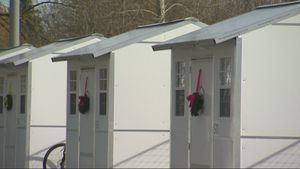Canadian hockey fans expressed their discontent with the U.S. government on Saturday night by booing the U.S. National Anthem before the Ottawa Senators' game against the Minnesota Wild. This act of protest came shortly after U.S. President Donald Trump announced significant tariffs on Canadian goods, igniting tensions between the two neighboring countries.
The booing echoed through the Canadian Tire Centre as singer Mandia Nantsios performed "The Star-Spangled Banner," with the crowd interrupting her performance with jeers and boos. This incident unfolded just hours after President Trump declared 25% tariffs on imports from Canada and announced a 10% tax on energy supplies, including oil and gas, effective Tuesday. The move, aimed at protecting American businesses, has been interpreted as the opening shot of what many fear could escalate to a full-blown trade war with Canada.
During the game, the anticipation surrounding the national anthem was palpable, but as Nantsios began her rendition, it quickly turned sour. Footage from the event captured fans booing loudly, with the noise crescendoing as she neared the end of the song. Some attendees even reported mixed reactions of applause alongside the discontent. After completing the anthem, Nantsios graciously prepared to sing the Canadian anthem, "O Canada," which was met with raucous applause and cheers from the crowd, as fans passed around the Canadian flag.
Trump's tariffs sparked outrage in Canada, prompting Prime Minister Justin Trudeau to issue threats of retaliatory measures. He announced Canada's intent to impose matching tariffs of 25% on about $155 billion worth of American goods, which includes popular items such as beer, wine, household appliances, and sporting goods. Trudeau lamented the division the tariffs have created, stating, "they split us apart instead of [brought] us together."
This current economic conflict between the U.S. and Canada serves as a bitter reminder of the longstanding issues surrounding trade policies and their impact on neighboring economies. Economists have warned of potential inflation spikes and rising costs for consumers, which could affect daily shoppers across the U.S. Analyzing the repercussions of Trump's tariffs, Professor Tim Kehoe from the University of Minnesota described Trump's plan as likely to have "huge, all-encompassing impacts," affecting prices and the agricultural sector.
The negative reactions from fans were not isolated to Ottawa, as similar incidents were observed earlier—Calgary Flames fans had booed the U.S. anthem before their game, and Montreal Canadiens fans demonstrated similar discontent prior to various games. Hockey has historically been more than just a sport for many Canadians, acting as a platform for national pride, and booing the U.S. National Anthem reflects the depths of frustration felt by fans toward their southern neighbor's current administration.
This sentiment was not lost on Nantsios, who addressed the incident on social media the next day, admitting she had expected backlash. "POV: everyone boo'd (sic) me singing the US national anthem but I'm a Virgo and idgaf," she wrote, adding later, "Thank you to everyone who reached out to let me know it wasn't toward me. They warned me beforehand."
Such protests at sporting events can serve as powerful emotional reactions to political actions, demonstrating how intertwined sports and politics can be. The NHL, for its part, has maintained its tradition of playing both national anthems prior to games between Canadian and American teams, and this most recent booing incident is among the few times fans have so vocally expressed dissent.
The Senators ended up soundly defeating the Wild with a 6-0 final score, perhaps providing some solace to the Canadian fans, albeit with mixed emotions marred by the political climate surrounding the game. The question now turns to future games where similar sentiments might reemerge; with the Vancouver Canucks hosting the Detroit Red Wings and the Toronto Raptors facing the Los Angeles Clippers soon, additional reactions from Canadian fans may be anticipated.
Trump has long used tariffs as part of his strategy to protect American businesses and reduce trade deficits, often invoking nostalgic sentiments about their potential to revive domestic manufacturing. He stated, "I love big, bold beautiful tariffs. They protect American businesses and encourage Americans to buy homegrown goods. I will use them as punitive measures against those who allow drugs to flood our country." His stance makes clear the contentious backdrop against which these international sporting events are occurring.
The booing of the U.S. anthem is set against the backdrop of historical grievances, illustrating how quickly sports can reflect the undercurrents of national sentiment. Past similar actions, such as Montreal's booing before the Iraq invasion, remind us of these moments where sports fandom overlaps with national pride and political discontent.
With both nations entangled in these economic hostilities, it remains to be seen how the dynamic will evolve moving forward and what role their respective sports teams will play as reflections of public sentiment.



